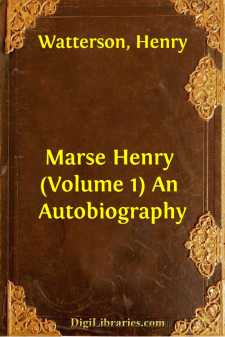Categories
- Antiques & Collectibles 13
- Architecture 36
- Art 48
- Bibles 22
- Biography & Autobiography 813
- Body, Mind & Spirit 142
- Business & Economics 28
- Children's Books 17
- Children's Fiction 14
- Computers 4
- Cooking 94
- Crafts & Hobbies 4
- Drama 346
- Education 46
- Family & Relationships 57
- Fiction 11829
- Games 19
- Gardening 17
- Health & Fitness 34
- History 1377
- House & Home 1
- Humor 147
- Juvenile Fiction 1873
- Juvenile Nonfiction 202
- Language Arts & Disciplines 88
- Law 16
- Literary Collections 686
- Literary Criticism 179
- Mathematics 13
- Medical 41
- Music 40
- Nature 179
- Non-Classifiable 1768
- Performing Arts 7
- Periodicals 1453
- Philosophy 64
- Photography 2
- Poetry 896
- Political Science 203
- Psychology 42
- Reference 154
- Religion 513
- Science 126
- Self-Help 84
- Social Science 81
- Sports & Recreation 34
- Study Aids 3
- Technology & Engineering 59
- Transportation 23
- Travel 463
- True Crime 29
Marse Henry (Volume 2) An Autobiography
by: Henry Watterson
Categories:
Description:
Excerpt
Chapter the Thirteenth
Charles Eames and Charles Sumner-Schurzand Lamar—I Go to Congress—A
Heroic Kentuckian—Stephen Foster and His Songs—Music and Theodore
Thomas
I
Swift's definition of "conversation" did not preside over or direct the daily intercourse between Charles Sumner, Charles Eames and Robert J. Walker in the old days in the National Capital. They did not converse. They discoursed. They talked sententiously in portentous essays and learned dissertations. I used to think it great, though I nursed no little dislike of Sumner.
Charles Eames was at the outset of his career a ne'er-do-well New Englander—a Yankee Jack-of-all-trades—kept at the front by an exceedingly clever wife. Through the favor she enjoyed at court he received from Pierce and Buchanan unimportant diplomatic appointments. During their sojourns in Washington their home was a kind of political and literary headquarters. Mrs. Eames had established a salon—the first attempt of the kind made there; and it was altogether a success. Her Sundays evenings were notable, indeed. Whoever was worth seeing, if in town, might usually be found there. Charles Sumner led the procession. He was a most imposing person. Both handsome and distinguished in appearance, he possessed in an eminent degree the Harvard pragmatism—or, shall I say, affectation?—and seemed never happy except on exhibition. He had made a profitable political and personal issue of the Preston Brooks attack. Brooks was an exceeding light weight, but he did for Sumner more than Sumner could ever have done for himself.
In the Charles Eames days Sumner was exceedingly disagreeable to me. Many people, indeed, thought him so. Many years later, in the Greeley campaign of 1872, Schurz brought us together—they had become as very brothers in the Senate—and I found him the reverse of my boyish ill conceptions.
He was a great old man. He was a delightful old man, every inch a statesman, much of a scholar, and something of a hero. I grew in time to be actually fond of him, passed with him entire afternoons and evenings in his library, mourned sincerely when he died, and went with Schurz to Boston, on the occasion when that great German-American delivered the memorial address in honor of the dead Abolitionist.
Of all the public men of that period Carl Schurz most captivated me. When we first came into personal relations, at the Liberal Convention, which assembled at Cincinnati and nominated Greeley and Brown as a presidential ticket, he was just turned forty-three; I, two and thirty. The closest intimacy followed. Our tastes were much alike. Both of us had been educated in music. He played the piano with intelligence and feeling—especially Schumann, Brahms and Mendelssohn, neither of us ever having quite reached the "high jinks" of Wagner.
To me his oratory was wonderful. He spoke to an audience of five or ten thousand as he would have talked to a party of three or six. His style was simple, natural, unstrained; the lucid statement and cogent argument now and again irradiated by a salient passage of satire or a burst of not too eloquent rhetoric....




